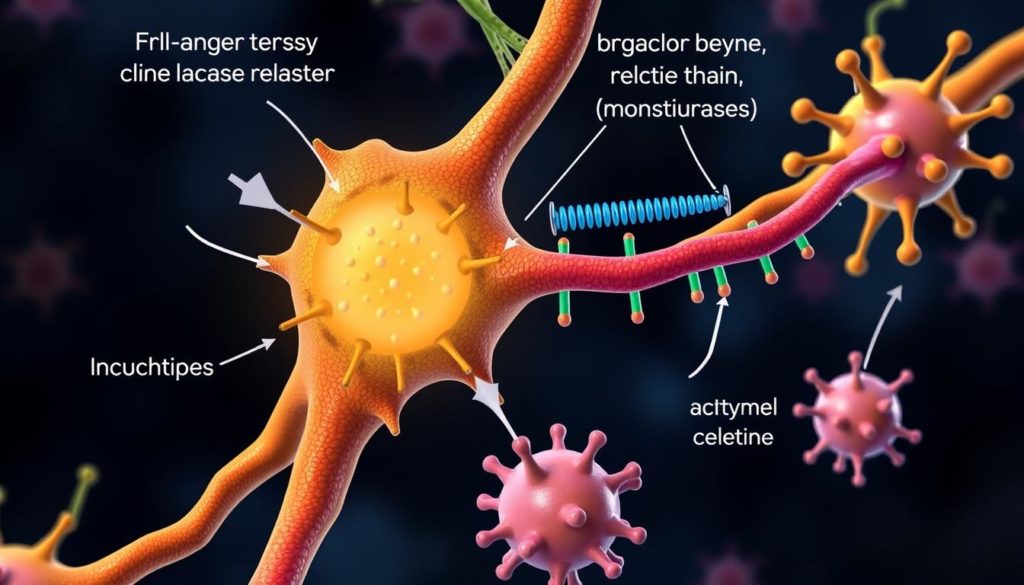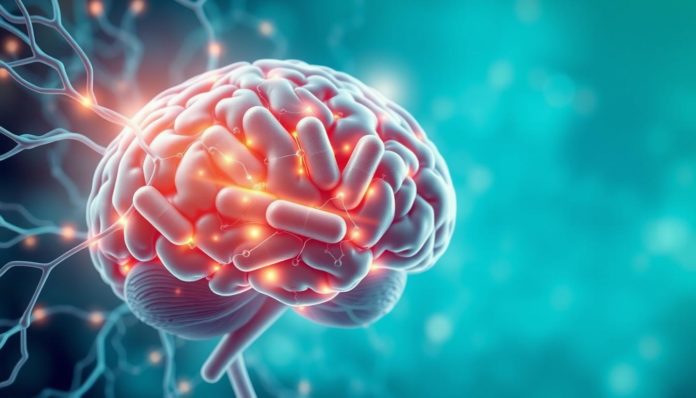More than 5.8 million Americans live with Alzheimer’s. This number is rising. We urgently need ways to manage symptoms. Cholinesterase inhibitors help with this. They improve cognitive function and protect nerve cells.
Doctors often prescribe these inhibitors soon after diagnosing Alzheimer’s. Their goal is symptom management, not a cure. These drugs slow the breakdown of acetylcholine. This neurotransmitter is key for memory and learning, which Alzheimer’s affects.
While they can’t stop Alzheimer’s, these inhibitors do offer relief. They help patients keep their cognitive abilities. This enhances their life quality. This guide will explain how cholinesterase inhibitors work. We’ll also cover their benefits and the top FDA-approved options.
Understanding Cholinesterase Inhibitors
Cholinesterase inhibitors are key in combating Alzheimer’s disease. They have made a groundbreaking journey from their discovery to their current usage. Today, they help many people enjoy improved thinking abilities.
What Are Cholinesterase Inhibitors?
Cholinesterase inhibitors are drugs that stop the breakdown of acetylcholine. They block the enzyme cholinesterase. This boosts acetylcholine levels in the brain. High acetylcholine improves nerve cell communication. This makes these drugs vital in treating Alzheimer’s.

History of Cholinesterase Inhibitors
The history of cholinesterase inhibitors began in the 1970s. Researchers found out how important acetylcholine is for memory. Through the years, we’ve learned more about Alzheimer’s. This helped us develop these drugs into strong treatments. The first drug, Tacrine, was approved in the early 1990s. It was a big moment in fighting Alzheimer’s.
Cholinesterase Function in the Brain
Cholinesterase is an enzyme that breaks down acetylcholine. This controls its levels in the brain. Having the right amount of acetylcholine is crucial for nerve signals. In diseases like Alzheimer’s, it’s important to keep acetylcholine levels up. Cholinesterase inhibitors do this. They boost brain communication, helping with memory and thinking. This means they not only ease symptoms but also offer hope for treating brain diseases.
How Cholinesterase Inhibitors Work
Understanding cholinesterase inhibitors begins with knowing how they work. These drugs increase acetylcholine in the brain, key for thinking clearly. Let’s explore their functions and effects further.
Mechanism of Action
Cholinesterase inhibitors stop acetylcholine from breaking down. By blocking the cholinesterase enzyme, they keep acetylcholine levels high. This is vital for improving memory and managing dementia.
Role of Acetylcholine
Acetylcholine is important for brain cell communication, especially in memory and learning areas. High acetylcholine levels mean better neuron signals. Cholinesterase inhibitors preserve this neurotransmitter, supporting brain health and aiding in dementia care.
Impact on Cognitive Functions
Cholinesterase inhibitors have a big impact on brain functions. They make neuron communication better, enhancing memory and learning. Patients often see their memory improve and dementia progress slower. These drugs significantly better daily life and the well-being of Alzheimer’s patients.

Benefits of Cholinesterase Inhibitors for Alzheimer’s Patients
Cholinesterase inhibitors help Alzheimer’s patients a lot. They make a big difference in their everyday lives. These meds are great for improving three main things.
Memory Enhancement
One big plus of these drugs is memory enhancement. People see better memory in remembering recent stuff and recognizing others. This can really help with their life and with friends and family.
Improvement in Cognitive Functions
Another key benefit is better thinking skills. Patients think clearer and faster, making daily tasks easier. They solve problems better and make smarter choices, leading to more independence.
Management of Dementia Symptoms
Also, these inhibitors are great for controlling dementia symptoms. They ease issues like upset feelings, worry, and sadness. This not only treats Alzheimer’s symptoms but also makes emotional health more stable. It helps patients feel better overall.
FDA-Approved Cholinesterase Inhibitors
The FDA approval of cholinesterase inhibitors is a big step forward in treating Alzheimer’s. Donepezil (Aricept), galantamine (Razadyne), and rivastigmine (Exelon) offer real help at different Alzheimer’s stages. Patients can choose from tablets, orally disintegrating tablets, capsules, and patches.
| Medication | Brand Name | Forms Available |
|---|---|---|
| Donepezil | Aricept | Tablets, Orally Disintegrating Tablets |
| Galantamine | Razadyne | Tablets, Capsules |
| Rivastigmine | Exelon | Capsules, Transdermal Patches |
These Alzheimer’s medications target symptoms from mild to severe. Donepezil is used at all stages of Alzheimer’s. Galantamine typically helps those with mild to moderate symptoms. Rivastigmine, which comes as a patch, is good for patients who can’t take pills well.
Choosing the right medicine depends on the patient’s needs. Yet, the success and availability of these FDA-approved inhibitors are key. They help manage Alzheimer’s and can improve life quality.
Donepezil (Aricept): Uses and Side Effects
Donepezil, known as Aricept, is a medication for Alzheimer’s disease. It is approved for use at any stage of the disease. The drug stops the breakdown of acetylcholine in the brain. This action helps improve brain function.
Administration and Dosage
Donepezil is taken by mouth either as a tablet or a disintegrating tablet. It usually begins at 5 mg daily. After checking tolerance, the dose might go up to 10 mg daily, following a doctor’s advice.
Common Side Effects
Donepezil is effective but has side effects. Nausea, diarrhea, and muscle cramps are often reported. It’s crucial to watch for these side effects. One should consult a doctor if they do not improve or get worse.
Donepezil Plus Memantine (Namzaric)
Combining donepezil with memantine, known as Namzaric, helps in moderate to severe Alzheimer’s. This mix can offer better symptom relief than donepezil on its own. Patients should note, though, this therapy might lead to dizziness and headaches.
Galantamine (Razadyne): Uses and Side Effects
Galantamine, known as Razadyne, is used for mild-to-moderate Alzheimer’s. It comes in immediate-release tablets and extended-release capsules. It boosts acetylcholine in the brain, crucial for memory and thinking skills.
Administration and Dosage
Galantamine offers two choices: daily tablets or extended-release capsules. Doctors start with a low dose and slowly increase it. This approach helps limit side effects while ensuring the drug works well.
Common Side Effects
Galantamine helps with Alzheimer’s but has side effects. Users might get headaches, feel sick, or have stomach issues like diarrhea. They might also feel dizzy or eat less than usual. It’s key to use it correctly and see the doctor often to keep side effects under control.
Knowing how to use Razadyne and watching for side effects helps manage Alzheimer’s. It makes life better for those with the disease and their caregivers.
Rivastigmine (Exelon): Uses and Side Effects
Rivastigmine is known by the brand name Exelon. It’s a top choice for Alzheimer’s treatment. It works for mild to moderate cases and sometimes, severe stages too.
Administration and Dosage
Rivastigmine comes in capsules and patches. The patch is great because it steadily gives medicine. This can ease stomach side effects linked with pills.
The patch is also easy to use and many patients find it more comfortable.
Common Side Effects
Common side effects with rivastigmine are muscle weakness, indigestion, and nausea. The patch often causes fewer stomach problems. This makes it better for people who struggle with pills.
It’s vital for caretakers to watch for side effects. They should talk to doctors to help manage them.
| Form | Advantages | Common Side Effects |
|---|---|---|
| Capsule | Oral intake, widely available | Nausea, indigestion |
| Transdermal Patch | Continuous delivery, ease of use | Muscle weakness, fewer gastrointestinal issues |
Cholinesterase Inhibitors for Alzheimer’s
Cholinesterase inhibitors, including acetylcholinesterase inhibitors, are key in treating Alzheimer’s. They boost memory and thinking by addressing the lack of certain brain chemicals. But, the right drug can vary from person to person.
These drugs do not stop the disease’s advancement. People might react differently to each inhibitor. Some may even need other drugs for the best effect. Yet, they are a big part of current treatments, aiming to better life for those with Alzheimer’s.
For more info on these drugs, check this detailed resource. It highlights the need for teamwork in care to get the best results in treating Alzheimer’s, ensuring a comprehensive treatment plan.
FAQ
What are Cholinesterase Inhibitors?
Cholinesterase inhibitors are medicines that help manage Alzheimer’s disease. They stop the breakdown of acetylcholine, a key brain chemical needed for thinking skills.
How do Cholinesterase Inhibitors work?
These drugs block an enzyme that breaks down acetylcholine. This increases acetylcholine in the brain. It helps brain cells communicate better and boosts thinking skills.
What are some FDA-approved Cholinesterase Inhibitors?
What benefits do Cholinesterase Inhibitors offer to Alzheimer’s patients?
They help with symptoms, improve memory, and thinking. This can make life better for those with Alzheimer’s.
What are the common side effects of Donepezil (Aricept)?
Side effects can be nausea, diarrhea, and muscle cramps. Using donepezil with memantine (Namzaric) might cause extra side effects.
How is Galantamine (Razadyne) administered?
Galantamine is a pill or an extended-release capsule. It’s used for mild-to-moderate Alzheimer’s.
What are the common side effects of Rivastigmine (Exelon)?
It can cause muscle weakness and stomach issues. Rivastigmine comes as a capsule or patch to help with stomach side effects.
Can Cholinesterase Inhibitors cure Alzheimer’s disease?
These drugs can’t cure Alzheimer’s. They manage symptoms and can help with brain function and life quality. Yet, the disease will still progress.
How does Acetylcholine impact cognitive functions in Alzheimer’s patients?
Acetylcholine is crucial for memory and learning. Alzheimer’s destroys neurons, leading to less acetylcholine. Cholinesterase inhibitors keep its levels higher, helping with brain function.
Why is close monitoring necessary when using Cholinesterase Inhibitors?
Monitoring helps control side effects, check the right dose, and see if the drug helps with Alzheimer’s symptoms in the patient.


